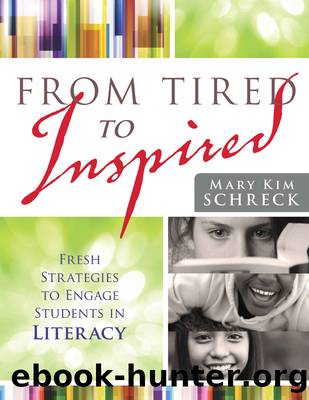From Tired to Inspired by Shreck Mary Kim;

Author:Shreck, Mary Kim;
Language: eng
Format: epub
Publisher: Solution Tree
Published: 2013-08-15T00:00:00+00:00
First Chapters Reading Day
First Chapters Reading Day is the best way we have found to help reluctant students decide what books they would like to read independently. In preparation for this day, we visit with our school librarian and request that a cart be filled with thirty to forty books, both fiction and nonfiction, that are considered the highest-interest books in our schoolâs collection. We are not concerned as much about reading level as we are about interest level. We will be using these books for one class period with as many classes as we have determined to be appropriate for this activity. All books will be returned by the end of the day.
Go to reproducible page 167, First Chapters Reading Day, to view the cards that students can use to document their reading. During this class period, students are invited to test out some of the books available in the library and to make a few judgment statements about them. They can choose any book they like, but they may only read the first chapter! Afterward, they must fill out the recommendation card and put the book back on the cart or table and pick up another to review. The groans that erupt when students must put the books back is the sweetest music to a teacherâs ears. And, the requirement to read only the first chapter appeals to reluctant readers, who feel overwhelmed at times when confronted with the responsibility of reading an entire book. Anyone can get through one chapter! If you like it you can go back later and check it out, but if you donât like it, who cares? Itâs no skin off your nose as they say! The opportunity to choose a skinny book over a fat one or nonfiction over fiction are other reasons reluctant readers find this activity to their liking.
The review card has many functions other than just documenting the fact students are on task. By asking students to evaluate and judge what they feel about the book, they are gently using those higher-order thinking skills that are so necessary when addressing more difficult activities. They are asked to judge the bookâs difficulty in Goldilocks fashionââtoo easy,â âtoo hard,â âjust right!â They are asked to suggest who would be interested in it. They are asked if they would like to read more. Then they are asked to briefly summarize what they found out in the first chapter. By being asked to comment on the bookâs strengths and weaknesses, students often find themselves commenting on author style, tone, point of view, diction, and so forth. These sheets give the teacher a wealth of information about the student as a reader as well as his or her reading tastes and abilities.
Download
This site does not store any files on its server. We only index and link to content provided by other sites. Please contact the content providers to delete copyright contents if any and email us, we'll remove relevant links or contents immediately.
Macmillan Primary Grammar 2 Pupil's Book by Unknown(444)
Figuring Out Fluency in Mathematics Teaching and Learning, Grades K-8 by Jennifer M. Bay-Williams & John J. SanGiovanni(398)
The Principal's Guide to Curriculum Leadership by Sorenson Richard D.;Goldsmith Lloyd M.;Mendez Zulma Y.;Maxwell Karen T.;(310)
Learning from Accidents 3rd ed by Trevor Kletz (2001)(288)
Harnessing Technology for Deeper Learning by Scott McLeod(269)
English Grammar Practice--The Noun by Roxana Nastase(269)
Text-Dependent Questions, Grades K-5 by Douglas Fisher & Nancy Frey & Heather Anderson & Marisol Thayre(254)
A Guide to Curriculum Mapping by Hale Janet A.;(241)
How to Do Everything with Google Tools by Unknown(241)
English Language Program Administration by Unknown(237)
The Grammar Teacher's Activity-a-Day by Jack Umstatter(224)
Deep Change Leadership by Reeves Douglas;(219)
The Power of SMART Goals by Conzemius Anne;O'Neill Jan; & Anne Conzemius(208)
Using Data to Close the Achievement Gap by Johnson Ruth S.;(194)
Functional Neuroradiology: Principles and Clinical Applications by Scott H. Faro (editor) Feroze B. Mohamed (editor)(192)
Aligning and Balancing the Standards-Based Curriculum by Squires David A.;(187)
Beyond the RTI Pyramid by Bender William N.;(187)
Using Equity Audits to Create Equitable and Excellent Schools by Skrla Linda E.;McKenzie Kathryn B.;Scheurich James Joseph;(185)
Skill Building for ESL and Special Education : Student Textbook by Kristine Setting Clark(185)
